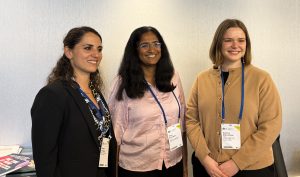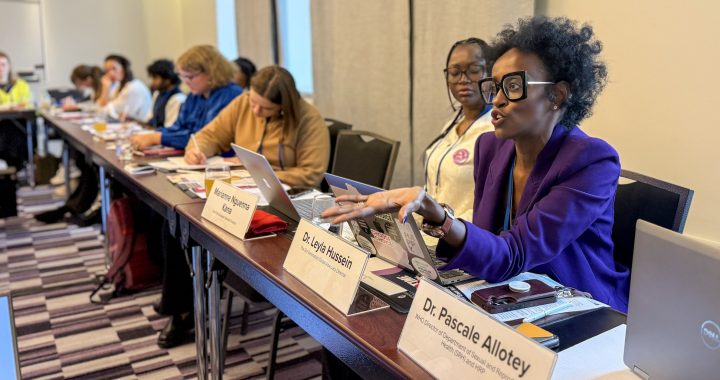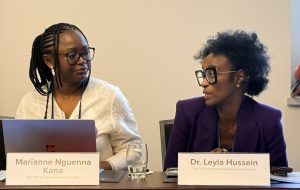Sign the declaration
‘’From Rhetoric to Reality: Closing the Funding Gap and Uniting for Action to End Female Genital Mutilation/Cutting’’
Vous pouvez télécharger la version française ci-dessous.
As hundreds of activists, grassroots organisations, international NGOs and academics who gathered at the Women Deliver 2023 Conference in Kigali, Rwanda, we are exercising our collective power to highlight the urgent resourcing need for the End Female Genital Mutilation/Cutting sector and launch the Kigali Declaration and the Call to Close the Funding Gap.
Over 200 million girls and women alive today from 31 countries have experienced female genital mutilation/cutting (FGM/C) and over 4 million girls are at risk of undergoing FGM/C annually. And this number is on the rise. However, even these alarming figures fail to represent the full picture, as they do not take into account countries (particularly in Asia and the Middle East) which do not have national prevalence data on FGM/C. Another report highlights that FGM/C has been reported to occur in 92 countries around the world.
Despite positive changes in the field of eliminating FGM/C in the last few decades, rapid population growth, insecurity and humanitarian crises in some countries with high prevalence rates, as well as emerging trends, such as medicalization of FGM/C threaten to roll back progress. This is exacerbated by the critical lack of funds to the end FGM/C sector.
¹ According to a joint report by UNICEF and UNFPA, an estimated 2 million additional girls are at risk of being cut over the next decade, bringing the total number of girls at risk to 70 million by 2030.
The Funding Gap
Adoption of the Sustainable Development Goals target 5.3.2 to end female genital mutilation/cutting by 2030 was an ambitious commitment. But rhetoric was simply not matched with financial commitments. According to an UNFPA Report, by investing $2.4 billion by 2030 we could end FGM/C altogether in 31 priority countries; and only $95 is required to avert one case of FGM/C. Yet only $275 million in development assistance is available leaving a funding gap of >$2.1 billion. However, the $2.1 billion needed does not include other countries where FGM/C is known to take place and which have not traditionally been prioritized, including in Asia and the Middle East.
Dear World Leaders and Donor Community,
As 2030 is fast approaching, the genuine need to bridge the significant funding gap and implement much-needed interventions to end FGM/C must be embraced with a sense of extreme urgency. Funding must be increased now, and it is essential for investment to come from a variety of sources – from multilateral donors, philanthropy, and the private sector, in addition to domestic resources committed by national Governments.
Signatories of this letter are calling on donors, multilateral entities and national governments to:
1. Significantly increase funding towards the end FGM/C sector
Every year, 4 million girls are at risk of being cut. That means 11,000 girls per day. More funders need to resource the end FGM/C sector to protect women and girls’ right to health, to bodily integrity, to freedom from violence and to enjoy their sexuality. How?
• Invest in efforts geared towards ending FGM/C and remodel their traditional funding practices to more effectively support grassroots organisations.
• Prioritize funding for ending FGM/C in national budgets through direct budget allocations and integration of FGM/C into other budgets, such as healthcare, education, etc.
• Expand the funding direction beyond the 31 priority countries to include countries which have not traditionally been prioritised, including in Asia and the Middle East.
• Put in place an accountability system to track the financial commitments with a focus on how much, to who, and in which geographies resources have been allocated.
• Explore new collaboration between traditional donors, private sector, governments and NGOs, particularly around innovative financing mechanisms
2. Shift the funding to grassroots organisations
It has been demonstrated that one of the most effective ways to end FGM/C is to engage the community at a grassroots level. Despite this, the funding to grassroot organisations remains patchy, short-term and not sustainable. The complexity of accessing funds through a myriad of bureaucratic hurdles and requirements and often for funds that are too short-term in nature is a major challenge for community organisations. Funding models need to be rooted in the power of purposeful grant-making and best respond to grassroots’ needs ensuring:
● Sustainable, multi-year funding
● Funding to support core/administrative costs
● Flexible funding with simplified requirements for application and reporting
● Capacity building/strengthening and leadership development support to grassroots organisation to access and manage funds
● Funding grounded in feminist principles that disrupt the power imbalance and shift the power to women and girls
3. Convene a Global Commitment Summit
The adoption of SDG 5, target 5.3.2 to end female genital mutilation by 2030 placed end FGM/C firmly on the global agenda. However the ambition to end FGM/C by 2030 was not matched with financial commitments. With less than 7 years left until the 2030 deadline, a critical action is needed to resource the end FGM/C sector. Stakeholders gathered at the Women Deliver End FGM/C Pre-Conference unanimously agree that a Global Summit for increased commitments and investment to achieve the elimination of FGM/C is urgently needed. We need:
● Champion countries that will drive the efforts to finance FGM/C sector globally, calling for increased investment, efficiency and equity in funding.
● To act with urgency and convene a Global Commitment Summit during a United Nations General Assembly session or other key UN gathering by 2025 to secure financial commitments and actions needed.
● The Summit to catalyse the resourcing of end FGM/C work, with needs and priorities of grassroot organisations firmly at its heart.
Now’s the time to #Closethefundinggap
Female Genital Mutilation/Cutting is a global practice that requires a global response. We are in a race against time. Without immediate action and significant increase in funding, there will be millions more girls affected by 2030 and beyond. Failure is not an option anymore.
ANNEX – WHERE FUNDING IS NEEDED THE MOST
This annex compiles the recommendations that emerged from the WD2023 End FGM/C Pre-Conference thematic collaborative working groups sessions. Therefore, it reflects the views of civil society actors and cross-sectoral stakeholders who work everyday to eliminate FGM/C across the world. The list of stakeholders represented is available at the end.
1. Thematic Group 1. Change from Within – Achieving FGM/C elimination through grassroots movements
• Work with grassroots organizations, youth-led initiatives and survivors to make funding decisions based on their needs and organizational capabilities. Invest in initiatives to empower survivors by providing them with the needed training, support and opportunities; and to strengthen capacities of grassroots organizations so they can receive the funding.
• Provide direct, long-term, accessible and sustainable funding to grassroots organizations, survivors and youth-led initiatives, particularly solutions that contribute to sustainable change. Learn more about the work done by grassroots organizations and survivor-led groups and trust their ability to deliver programmes by funding them directly without intermediaries.
• Adjust application processes for funding, as complicated processes end up shutting grassroot organisations out of funding streams. Introduce flexible eligibility criteria and simplified reporting for grassroots organizations and movements working to end FGM/C, which decrease the bureaucratic chains and redtape surrounding funding. Shift thecolonial mindset that still tends to dominate the flow of funding in the anti-FGM/C sector.
2. Thematic group 2. Bridging the Gap – Law and Policy on FGM/C
• Fund initiatives that advocate for comprehensive and holistic laws and policies on FGM/C; as well as those focused on improving implementation, including through promoting safe and effective methods for individuals to report violations of existing legislation.
• Recognize that FGM/C is a global problem that requires local solutions, and that the survivor-led, grassroots organizations need to be consulted when it comes to the creation of policy and law, as they have the highest rate of success in ending FGM/C in their communities.
• Promote implementation of laws and policies on FGM/C, including ensuring that there is adequate budget for their implementation at local, regional, and national levels Implement effective monitoring and evaluation mechanisms to assess implementation of laws and policies and to track spending of budget lines allocated towards ending FGM/C. This also requires funding of research that measures impact and outcomes of existing laws and policies against FGM/C.
3. Thematic Group 3. Harnessing the Power of Youth and the Role of Formal and informal education in ending FGM/C
• Invest in leadership trainings, peer to peer learning forums and educational and vocational initiatives that address gender inequity and empower girls and women to become financially independent. Support initiatives providing young people with opportunities to receive mentorship from established NGOs and other stakeholders.
• Provide funding for programs that will allow for safe and transformative conversations about FGM/C with impacted communities, survivors and young people. Prioritize mental health approaches and programs that will support survivors and create safe spaces to explore the traumatic impact of FGM/C across generations.
• Support programmes that promote intergenerational dialogue and collaboration between established NGOs and youth-led initiatives. Effective intergenerational cooperation can be increased by identifying the hallmarks and shortcomings of each generation, as well as promoting flexibility and adaptability within established NGOs to recognize the need to change methodologies to meet changing times. Such efforts must also encourage youth to innovate and contribute to the anti-FGM/C dialogue and global effort.
4. Thematic Group 4. Evidence, Research, Data-collection – orient action based on evidence
• Allocate resources for data collection and research that will provide realistic estimates of the number of women and girls affected by FGM/C worldwide. This specifically requires investment in: (i) collecting national prevalence data in countries and regions where FGM/C is known to occur but there is no data available (like Middle East and Asia) and (ii) collecting and utilising subnational/localised data in countries where such data is limited, which hinders the ability to effectively target programs in the most affected areas and populations.
• Support initiatives to build the evidence base of what works to end FGM/C, including by elevating local level data from grassroots and successess of localised programmes and by building capacity of grassroots organisations to conduct quality evaluations. Address the issue of access of grassroots actors to data and evidence that is not accessible due to a number of factors, including research being predominantly published in English, kept behind academic firewalls or presented with complex language.
• Support monitoring and evaluation approaches to effectively measure shift in mentalities and attitudes towards addressing FGM/C as this approach is often used by grassroots organizations, survivors and youth-led initiatives. Promote an environment that enables openness and honesty, and allows programs to change directions based on M&E findings of approaches that have not worked. Short-term funding cycles, donor-driven agendas, and resistance to admit when approaches do not work are hindering progress toward better understanding and effectiveness.
5. Thematic group 5. Emerging Trends: Addressing Medicalization of FGM/C and Cross-border FGM/C
• Be adaptive and responsive to new data and research on FGM/C to shift funding streams and respond quickly to emerging trends.
• Fund research to understand the impact of climate change, cross-border FGM/C and other intersecting issues on the perpetuation and practice of FGM/C. Go beyond usual funding mechanisms and siloed funding approaches.
• Support the enforcement of policies and guidelines that explicitly prohibit health professionals from engaging in or supporting FGM/C. Effectively addressing medicalization of FGM/C will also require funding projects aimed at addressing the root causes of FGM/C including gender inequality and addressing it as a form of sexual assault; as well as projects that undertake behavioural change for community mobilization to reduce the demand for FGM/C.
Téléchargez le texte de la Déclaration en français ici.
Download the Declaration in English here.
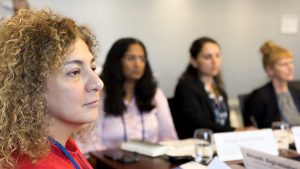 Opening the discussion, Anush Aghabalyan, Head of Advocacy and Policy at Orchid Project, stressed the need to reframe FGM/C as both a human rights violation and a health emergency. “FGM is often framed as a cultural practice, but it’s one of the worst forms of gender-based violence,” rooted in patriarchy and control of women’s bodies she explained. “At the same time, given its severe consequences, it is a profound health crisis.”
Opening the discussion, Anush Aghabalyan, Head of Advocacy and Policy at Orchid Project, stressed the need to reframe FGM/C as both a human rights violation and a health emergency. “FGM is often framed as a cultural practice, but it’s one of the worst forms of gender-based violence,” rooted in patriarchy and control of women’s bodies she explained. “At the same time, given its severe consequences, it is a profound health crisis.”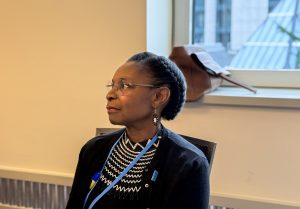 Dr Pascale Allotey, Director of WHO’s Department of Sexual, Reproductive, Maternal, Child and Adolescent Health and Ageing, outlined the economic and ethical implications. FGM/C is documented in over 90 countries, with an annual medical cost of USD 1.4 billion, projected to rise at the current rate of progress.
Dr Pascale Allotey, Director of WHO’s Department of Sexual, Reproductive, Maternal, Child and Adolescent Health and Ageing, outlined the economic and ethical implications. FGM/C is documented in over 90 countries, with an annual medical cost of USD 1.4 billion, projected to rise at the current rate of progress.